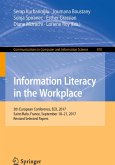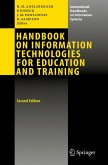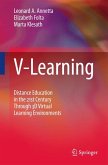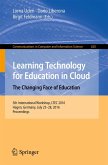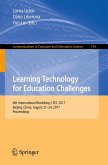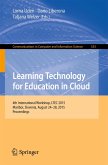International Handbook of Virtual Learning Environments (eBook, PDF)
Redaktion: Weiss, Joel; Trifonas, Peter; Hunsinger, Jeremy; Nolan, Jason


Alle Infos zum eBook verschenken

International Handbook of Virtual Learning Environments (eBook, PDF)
Redaktion: Weiss, Joel; Trifonas, Peter; Hunsinger, Jeremy; Nolan, Jason
- Format: PDF
- Merkliste
- Auf die Merkliste
- Bewerten Bewerten
- Teilen
- Produkt teilen
- Produkterinnerung
- Produkterinnerung

Hier können Sie sich einloggen

Bitte loggen Sie sich zunächst in Ihr Kundenkonto ein oder registrieren Sie sich bei bücher.de, um das eBook-Abo tolino select nutzen zu können.
What is virtual reality and how do we conceptualize, create, use, and inquire into learning settings that capture the possibilities of virtual life? The International Handbook of Virtual Learning Environments was developed to explore Virtual Learning Environments (VLE's), and their relationships with digital, in real life and virtual worlds.
Three issues are explored and used as organizers for The Handbook. First, a distinction is made between virtual learning and learning virtually. Second, since the focus is on learning, an educational framework is developed as a means of bringing…mehr
- Geräte: PC
- ohne Kopierschutz
- eBook Hilfe
- Größe: 12.38MB
![Information Literacy in the Workplace (eBook, PDF) Information Literacy in the Workplace (eBook, PDF)]() Information Literacy in the Workplace (eBook, PDF)81,95 €
Information Literacy in the Workplace (eBook, PDF)81,95 €![Handbook on Information Technologies for Education and Training (eBook, PDF) Handbook on Information Technologies for Education and Training (eBook, PDF)]() Handbook on Information Technologies for Education and Training (eBook, PDF)161,95 €
Handbook on Information Technologies for Education and Training (eBook, PDF)161,95 €![Quality Education @ a Distance (eBook, PDF) Quality Education @ a Distance (eBook, PDF)]() Quality Education @ a Distance (eBook, PDF)73,95 €
Quality Education @ a Distance (eBook, PDF)73,95 €![V-Learning (eBook, PDF) V-Learning (eBook, PDF)]() Leonard A. AnnettaV-Learning (eBook, PDF)73,95 €
Leonard A. AnnettaV-Learning (eBook, PDF)73,95 €![Learning Technology for Education in Cloud - The Changing Face of Education (eBook, PDF) Learning Technology for Education in Cloud - The Changing Face of Education (eBook, PDF)]() Learning Technology for Education in Cloud - The Changing Face of Education (eBook, PDF)40,95 €
Learning Technology for Education in Cloud - The Changing Face of Education (eBook, PDF)40,95 €![Learning Technology for Education Challenges (eBook, PDF) Learning Technology for Education Challenges (eBook, PDF)]() Learning Technology for Education Challenges (eBook, PDF)40,95 €
Learning Technology for Education Challenges (eBook, PDF)40,95 €![Learning Technology for Education in Cloud (eBook, PDF) Learning Technology for Education in Cloud (eBook, PDF)]() Learning Technology for Education in Cloud (eBook, PDF)40,95 €
Learning Technology for Education in Cloud (eBook, PDF)40,95 €-
-
-
Three issues are explored and used as organizers for The Handbook. First, a distinction is made between virtual learning and learning virtually. Second, since the focus is on learning, an educational framework is developed as a means of bringing coherence to the available literature. Third, learning is defined broadly as a process of knowledge creation for transforming experience to reflect different facets of "the curriculum of life".
To reflect these issues The Handbook is divided into four sections: Foundations of Virtual Learning Environments; Schooling, Professional Learning and Knowledge Management; Out-of-School Learning Environments; and Challenges for Virtual Learning Environments. A variety of chapters representing different academic and professional fields are included. These chapters cover topics ranging from philosophical perspectives, historical, sociological, political and educational analyses, case studies from practical and research settings, as well as several provocative ''classics' originally published in other settings.
Dieser Download kann aus rechtlichen Gründen nur mit Rechnungsadresse in A, B, BG, CY, CZ, D, DK, EW, E, FIN, F, GR, HR, H, IRL, I, LT, L, LR, M, NL, PL, P, R, S, SLO, SK ausgeliefert werden.
- Produktdetails
- Verlag: Springer Netherlands
- Seitenzahl: 1615
- Erscheinungstermin: 24. November 2007
- Englisch
- ISBN-13: 9781402038037
- Artikelnr.: 37353256
- Verlag: Springer Netherlands
- Seitenzahl: 1615
- Erscheinungstermin: 24. November 2007
- Englisch
- ISBN-13: 9781402038037
- Artikelnr.: 37353256
- Herstellerkennzeichnung Die Herstellerinformationen sind derzeit nicht verfügbar.

